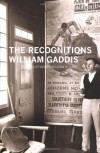Blogged Out Ma Nut
Emoticoning but with letters.
The Ticket That Exploded
 Best Burroughs I've read so far. Just fragmented enough to have his same manic digressive style but coherent enough to conjure his bizarre imagery. Not so much a novel as epic beat poetry.
Best Burroughs I've read so far. Just fragmented enough to have his same manic digressive style but coherent enough to conjure his bizarre imagery. Not so much a novel as epic beat poetry.
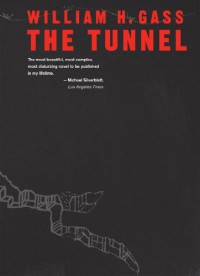 Poems that will make you cry, limericks that will make you laugh, beautiful metaphors and gripping dark recollections, not bad for a cantankerous old bastard (which I say affectionately, of course).
Poems that will make you cry, limericks that will make you laugh, beautiful metaphors and gripping dark recollections, not bad for a cantankerous old bastard (which I say affectionately, of course).
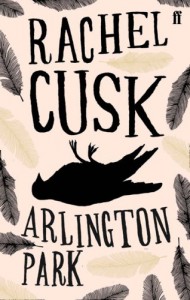 Interesting enough if it was a set of discrete short stories, but as a novel it requires more progression. 'Over the course of a day in an English...' instantly spells Dalloway- that's some fierce competition.
Interesting enough if it was a set of discrete short stories, but as a novel it requires more progression. 'Over the course of a day in an English...' instantly spells Dalloway- that's some fierce competition.
 What the hell am I supposed to say about this?
What the hell am I supposed to say about this?The parts I understood were hugely inspirational to my own thoughts, if I did indeed understand those parts, which I suspect I did not.
What a shame that someone so clever who had decided that this book was the be-all and end-all to problems in philosophy could only communicate them in a form that often eludes human comprehension.
It's like the saying that if the human brain were simple enough for us to understand it then we would be too stupid to do so, that the brain was not something we were ever going to understand.
Perhaps if someone were indeed smart enough to resolve all problems in philosophy then they could only communicate it in an incomprehensible language.
Then they would decide later that they were wrong anyway.
WTF.
Data Trace (Salt Modern Poets)
 Bought this after attending Ronnie McGrath's creative writing class at Imperial College London.
Bought this after attending Ronnie McGrath's creative writing class at Imperial College London.Great collection of poetry influenced by postmodernism and Dada- McGrath creates his own lyrical talismans and uses them to build a surreal world.
 Not his best, by any stretch. The first 180 or so pages were amazing, where it might well have stopped and been named "How the Living Die." The whole book is undeniably well-written: unfortunately, Will was kicking the gear while he wrote this, and his delirious mind needed a focus. I'm glad he's over it, but I didn't need to read his ravings.
Not his best, by any stretch. The first 180 or so pages were amazing, where it might well have stopped and been named "How the Living Die." The whole book is undeniably well-written: unfortunately, Will was kicking the gear while he wrote this, and his delirious mind needed a focus. I'm glad he's over it, but I didn't need to read his ravings.
 What the hell this is so boring and aimless, and just not very well crafted either. I have to return to [a:Murakami|3354|Haruki Murakami|http://d.gr-assets.com/authors/1350230608p2/3354.jpg]'s rule from [b:1Q84|10357575|1Q84 |Haruki Murakami|http://d.gr-assets.com/books/1359439026s/10357575.jpg|18160093]: if the reader hasn't seen something before, you should take extra time to describe it.
What the hell this is so boring and aimless, and just not very well crafted either. I have to return to [a:Murakami|3354|Haruki Murakami|http://d.gr-assets.com/authors/1350230608p2/3354.jpg]'s rule from [b:1Q84|10357575|1Q84 |Haruki Murakami|http://d.gr-assets.com/books/1359439026s/10357575.jpg|18160093]: if the reader hasn't seen something before, you should take extra time to describe it.And I knew it. I knew if I even caught a sniff of criticism of this book they would call it 'Kafka-esque', everyone's favourite shorthand for weird and depressing*. People praise [a:Murakami|3354|Haruki Murakami|http://d.gr-assets.com/authors/1350230608p2/3354.jpg] for his true understanding of [a:Kafka|5223|Franz Kafka|http://d.gr-assets.com/authors/1287463493p2/5223.jpg], and I have to praise him too because I don't get Kafka, but I have a strong inkling for what someone is going to call Kafka-esque, which often only tells me that the critic is reminded of Kafka, and not necessarily that the writing has any qualities of Kafka. Incidentally, this also feels like the depths of [a:Banks|7628|Iain Banks|http://d.gr-assets.com/authors/1304977070p2/7628.jpg]' understanding of Kafka. Kafka.
Okay, so this is a book about psychology and an in-depth exploration of our relationships, but first and foremost, it may come as a surprise that it's actually about a fucking bridge. And if you go 'I got in the lift, I went to the building' where is the lift? The building, in relation to the bridge? Alongside it? Does it occlude the passage along the bridge? Then your character goes beneath the bridge and starts cutting about**. I didn't even know what the top of the bridge looked like! Now you're underneath it? What's there? I am given next to no tools to visualise this bridge, the buildings etc.
If you're going to build a weird world, well... build it. If you have a message about relationships, don't expect to wow me with psychoanalysis and literary quality before you have a plot, characters and- oh god!- a setting.
Go home literature, you're drunk.
*I forgot [a:Beckett|1433597|Samuel Beckett|http://d.gr-assets.com/authors/1330861495p2/1433597.jpg], too. Was it weird and depressing? Yeah. Didyageddit? No. Beckett!
**Scottish 'walking about'
 In order of necessity, what I have to say about this book:
In order of necessity, what I have to say about this book:1. Have I ever felt so angry that I needed to write [b:Hogg|85865|Hogg|Samuel R. Delany|http://d.gr-assets.com/books/1354642149s/85865.jpg|589031]? Absolutely, but with almost none of the skill, and I’m endlessly thankful that I didn’t need to endure the writing process of this book.
2. If I had to choose to endure the violence of a victim from either [b:American Psycho|28676|American Psycho|Bret Easton Ellis|http://d.gr-assets.com/books/1348400564s/28676.jpg|2270060] or Hogg, it would easily be American Psycho. Still, I feel that AP is excessive, and Hogg is necessary art. Hogg is unipolar throughout, and would only make its statement if it was driven to the absolute extreme (which it undoubtedly is- the most disgusting thing I can possibly think of is a child sucking pus from a dick with a rusty nail in it(disgusting imagery from the book hidden). If you can think of sicker, you have my pity, because Hogg at least exceeded the limits of my own imagination at its most twisted.)
3. The reading of this book that I would like to focus on, if it isn’t already clear, is that of homosexual frustration. I can’t begin to imagine how brave Delany had to be to write Hogg, and the message is just as true today, despite the much larger support of gay rights. My interpretation is that Hogg is the depraved world perceived by the homophobe once sexual deviance becomes commonplace. And it is completely ludicrous. It epitomises how we are made to feel by homophobes, as savages incapable of love, as pillagers and destroyers who carve out a hideous unlivable reality. In Hogg, I see that Delany has the vision and the self-belief to see that he is not a worm, a lower class citizen, but every bit as important as anyone else. I don’t know that I would have had that strength in the face of public opinion in the 60s, and I hugely admire Delany for this. To think that it was written so closely to the time of the Stonewall Riots, it is clearly a brilliantly-executed chunk of spirit representative of homosexual thought for the time.
4. In spite of how much I would love to celebrate the forward-thinking society I live in, so long as a wilfully ignorant individual exists, I will occasionally lose hours of sleep. Hogg is here to reassure me, and you.
5. I did not recommend this book to you. You should not read it. But you should be happy that it exists.
The Rag: Winter/Spring 2013
 The first I read.
The first I read.Did I like it? Yes.
Would I read it again? Yes.
Some good stories in it:
- Memento Mori by Stefanie Demas- Murakami-esque necrophilia (!!)
- Not Giving to the Alumni Fund by David Blanton- The seductive life of crime for Halo fanboys
- The Girl with Pretension in Her Hair by Bill Lytton- London people watching (and judging and hating)
And per author, there are not hugely noticeable changes in the style- that’s a good thing I think, the stories are well-curated and the magazine has a clear voice.
I don’t know how avoidable this is, or how useful it is to say, but it was occasionally too American for me. If you say mid-west, if you say Illinois, nothing is communicated to me, in which case it needs to be a bit more instructive.
Regardless, lots of exciting punchy stories from mostly new young writers- perhaps that’s always going to be a risk or perhaps not. New writing can be better crafted and more urgent than the stuff of the previously published.
Check it out.
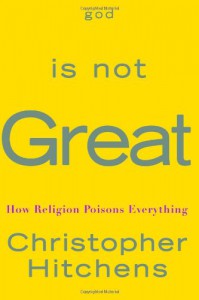 Better than [b:The God Delusion|14743|The God Delusion|Richard Dawkins|http://d.gr-assets.com/books/1347220693s/14743.jpg|3044365], but still a bit furry in places :)
Better than [b:The God Delusion|14743|The God Delusion|Richard Dawkins|http://d.gr-assets.com/books/1347220693s/14743.jpg|3044365], but still a bit furry in places :)
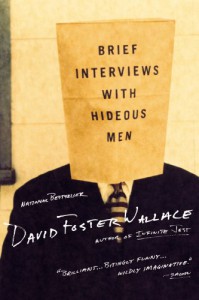 Don't want to dwell on this too much or personalise the review, only...
Don't want to dwell on this too much or personalise the review, only...Regardless of what you think of his other work, or the types of books you like, you are a human living in the present who needs to READ THIS.
Actually I just checked and there are reviews giving this less than 5 stars so apparently I do!
I won't reveal too much about the individual stories because I don't want to take away the surprise, but:
- Amongst other devices, post-modern or otherwise, metafiction and the dreaded poioumena are used properly and to fantastic effect: yes, they are. I've never seen it done before. Never understood it, but peeling back the layers of the storytelling to reveal the process of writing works amazingly with some of these stories in that it for example shows the inability to craft a powerful story in modern times without sounding like you're falling into cliche, and even reflecting our own angst in doing this when we talk to each other (I definitely do this and I'm worried you think that what I just wrote is pretentious. Such is the unavoidable nature of contributing anything! And one of the best messages here is that double-guessing and attempted likeability can be fatal to anything worth saying. So I'm leaving it.)
- Bar 2 or 3, each of these stories feels like a punch in the face, and whether or not you agree with DFW's analysis (and it is often open anyway) you owe it to yourself to ask... yourself the questions that they pose, even if you end up concurring with your own philosophy heretofore.
- These stories are what the short story is for. Asking yourself 'What is a short story?' feels redundant but the question no less rhetorical, and I think this collection is a great example of what short stories do. [b:Infinite bloody Jest|6759|Infinite Jest|David Foster Wallace|http://d.gr-assets.com/books/1165604485s/6759.jpg|3271542], say, cannot achieve what these stories can- not that it is better or worse, it is only not a short story, agreed?
So as an homage to what I think this book stands for, at risk of sounding gushy or pretentious, trite or pleading for attention, these are my bare bones honest thoughts. I would strongly advise that you read this book.
The Paraguayan War: Armies of the Nineteenth Century - The Americas (Armies of the 19th Century: The Americas)
 Of this, [b:To the Bitter End: Paraguay and the War of the Triple Alliance|157059|To the Bitter End Paraguay and the War of the Triple Alliance|Chris Leuchars|http://d.gr-assets.com/books/1348034717s/157059.jpg|151566] and [b:Weep, Grey Bird, Weep: The Paraguayan War 1864-1870|10993503|Weep, Grey Bird, Weep The Paraguayan War 1864-1870|Roger Kohn|http://d.gr-assets.com/books/1349073330s/10993503.jpg|15912107] I referred to this one the least- not to say it isn't informative but not the most interesting either.
Of this, [b:To the Bitter End: Paraguay and the War of the Triple Alliance|157059|To the Bitter End Paraguay and the War of the Triple Alliance|Chris Leuchars|http://d.gr-assets.com/books/1348034717s/157059.jpg|151566] and [b:Weep, Grey Bird, Weep: The Paraguayan War 1864-1870|10993503|Weep, Grey Bird, Weep The Paraguayan War 1864-1870|Roger Kohn|http://d.gr-assets.com/books/1349073330s/10993503.jpg|15912107] I referred to this one the least- not to say it isn't informative but not the most interesting either.
 1
1
Currently reading
The Recognitions
Progress:
200/935 pages
The Recognitions
In Search of Lost Time
Teach Yourself Norwegian Complete Course Package (Book + 2 CDs) [With 2 CD's]




